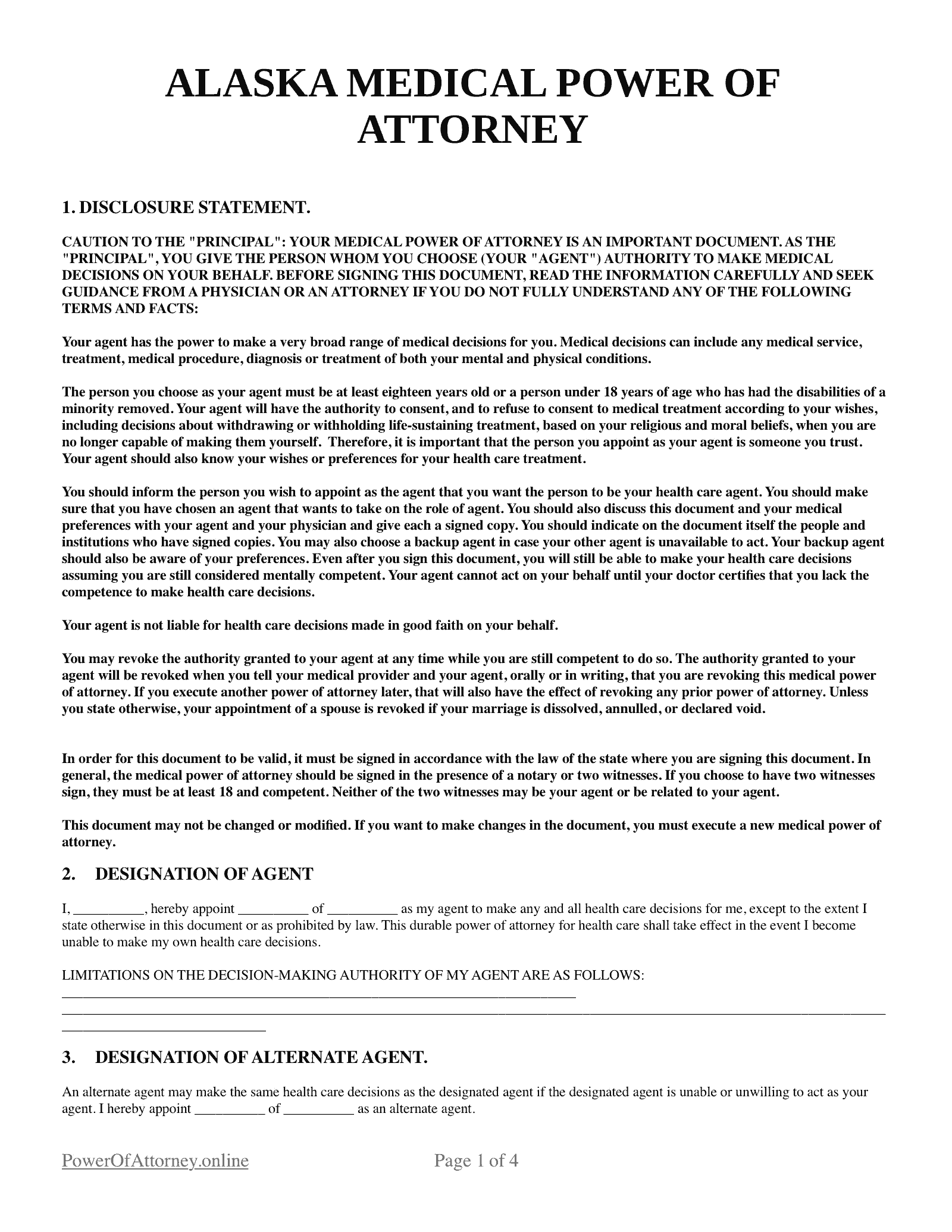Free Alaska Medical Power of Attorney Forms
An advance health care directive, another term for a medical power of attorney (POA), allows a person or agent to execute medical decisions on behalf of a principal or the person enacting the POA. The contract ensures that the principal’s medications and treatment will not be interrupted should they become incapacitated.

Alaska Medical Power of Attorney Laws
Advance Health Care Directives - The law states that an individual can provide instructions about their healthcare needs. The directive can be durable, which means the agent can continue to make decisions on behalf of the principal even when they become incompetent. The law states: “The power must be in writing, contain the date of its execution, be signed by the principal, and be witnessed” (Alaska Statutes 2022 § 13.52.010).
Signing Requirements in Alaska
In Alaska, the medical power of attorney must be signed by the principal. If the principal cannot sign because of a disability, another person can sign on their behalf as long as the principal approves it. The form becomes legal when it is witnessed by at least two people whom the principal personally knows or a notary public.
Certain individuals are ineligible witnesses: “A healthcare provider employed at the healthcare institution or healthcare facility where the principal is receiving health care; an employee of the healthcare provider providing healthcare to the principal, or of the healthcare institution or healthcare facility where the principal is receiving health care” (Alaska Statutes 2022 § 13.52.010).
How To Write a Medical POA in Alaska
With a medical POA, the agent acts with the authority to make medical decisions on behalf of the principal. Such choices include medications, treatments, surgeries, and procedures, as well as difficult end-of-life judgments.
Here are the steps in writing a medical POA in Alaska:
1. Pick an agent
Choosing an agent and the responsibilities that the agent assumes aren’t easy. Hence, principals must carefully choose someone whom they trust immensely. Family members, such as a spouse, child, or sibling, can be appointed agents.
As you make your selection, remember that this person will be responsible for deciding on your medications, medical treatments and procedures, and other healthcare concerns when you can no longer make these decisions for yourself. They may even make end-of-life decisions for you.
Once you have decided on the agent, talk to them.
2. Discuss responsibilities and compensation with the agent
The agent’s role can be as broad or as specific as you need it to be. Make sure they understand their duties and what they may entail. Since most agents are paid (even if they’re family members), you need to talk about compensation and reimbursable expenses (food, travel, accommodations, transportation) they accrue while performing their duties.
3. Download an Alaska medical POA template
For your convenience, download a printable template of the Alaska medical POA. Make sure the form is acceptable in Alaska. An online template already has the standard format of a POA so all you need to do is customize it to your situation.
4. Sign the document
Sign the POA. There may be situations where the principal cannot sign the document because of a disability. If this is the case, they can designate someone to sign on their behalf. The act must be witnessed by a notary public or at least two individuals who personally know the principal.
Agents are ineligible as witnesses, as well as employees and owners of the healthcare facility where the principal receives treatment (unless related to the principal by blood).
5. Use the Alaska medical power of attorney
The document is now legal and executory. Every time the agent makes a decision on the principal’s behalf, they need to provide the document as evidence of written permission.